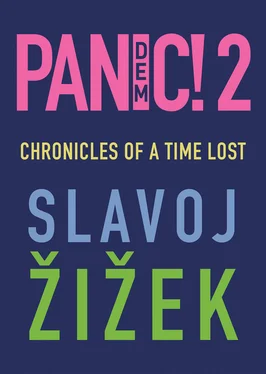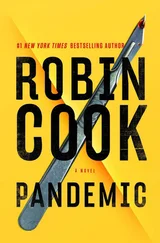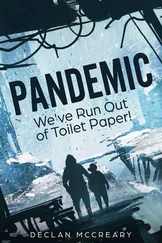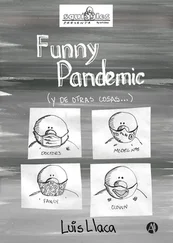1 Cover
2 Title Page PANDEMIC! 2 Chronicles of a Time Lost SLAVOJ ŽIŽEK polity
3 Copyright This edition published by Polity Press, 2021 First published in the United States by OR Books LLC, New York, 2020 © Slavoj Žižek, 2020 All rights reserved. No part of this book may be reproduced or transmitted in any form or by any means, electronic or mechanical, including photocopy, recording, or any information storage retrieval system, without permission in writing from the publisher, except brief passages for review purposes. 9781509549085
4 Dedication Dedication To all those whose daily lives are so miserable that they ignore Covid-19, regarding it as a comparatively minor threat.
5 Introduction: Why a Philosopher Should Write about Bringing In the Harvest
6 1. What We Don’t Know, What We Don’t Want to Know, and What We Can Do
7 2. The First of May in the Viral World
8 3. Covid-19, Global Warming, Exploitation— The Same Struggle
9 4. Why Destroying Monuments Is Not Radical Enough
10 5. Father or Worse
11 6. Sex in the Age of Social Distancing
12 7. The (Not So) Brave New World of Pigs and Men
13 8. A No-Touch Future? No, Thanks!
14 9. Where Are Greta and Bernie?
15 10. What Movie Is Now Playing Out in Real Life?
16 11. Deaths in Paradise
17 12. Now We Live in a Store of the Worlds
18 13. Yes, Red Pill but Which One?
19 14. Simple Things That Are Hard to Do
20 (No Time) to Conclude: The Will Not to Know
21 Appendix: Four Reflections on Power, Appearance, and Obscenity The New Obscene Master Oppression, Repression, Depression The New Populism Is Not Fascism The Crisis of New Populism
22 About the Aouthor
23 End User License Agreement
1 Cover
2 Table of Contents
3 Title Page
4 Copyright
5 Dedication
6 Introduction
7 Begin Reading
8 (No Time) to Conclude: The Will Not to Know
9 Appendix: Four Reflections on Power, Appearance, and Obscenity
10 About the Aouthor
11 End User License Agreement
1 iii
2 iv
3 v
4 1
5 2
6 3
7 4
8 5
9 7
10 9
11 10
12 11
13 12
14 13
15 14
16 15
17 17
18 19
19 20
20 21
21 22
22 23
23 25
24 26
25 27
26 28
27 29
28 30
29 31
30 33
31 34
32 35
33 36
34 37
35 38
36 39
37 40
38 41
39 43
40 44
41 45
42 46
43 47
44 48
45 49
46 51
47 52
48 53
49 54
50 55
51 57
52 59
53 60
54 61
55 62
56 63
57 65
58 66
59 67
60 68
61 69
62 71
63 72
64 73
65 75
66 77
67 78
68 79
69 80
70 81
71 82
72 83
73 85
74 86
75 87
76 88
77 89
78 91
79 92
80 93
81 94
82 95
83 96
84 97
85 99
86 100
87 101
88 102
89 103
90 105
91 107
92 108
93 109
94 110
95 111
96 112
97 113
98 114
99 115
100 116
101 117
102 119
103 120
104 121
105 122
106 123
107 124
108 125
109 126
110 127
111 128
112 129
113 130
114 131
115 132
116 133
117 134
118 135
119 136
120 137
121 138
122 139
123 140
124 141
125 142
126 143
127 144
128 145
129 146
130 147
131 149
132 150
133 151
134 152
135 153
136 154
137 155
138 156
139 157
140 158
141 159
142 160
143 161
144 162
145 163
146 164
147 165
148 166
149 167
150 168
151 169
152 170
153 171
154 172
155 173
156 174
157 175
158 176
159 177
160 178
161 179
162 180
163 181
164 182
165 183
166 184
167 185
168 186
169 187
170 188
171 189
172 190
173 191
174 193
175 194
PANDEMIC! 2
Chronicles of a Time Lost
SLAVOJ ŽIŽEK
polity
This edition published by Polity Press, 2021
First published in the United States by OR Books LLC, New York, 2020
© Slavoj Žižek, 2020
All rights reserved. No part of this book may be reproduced or transmitted in any form or by any means, electronic or mechanical, including photocopy, recording, or any information storage retrieval system, without permission in writing from the publisher, except brief passages for review purposes.
9781509549085
To all those whose daily lives are so miserable that they ignore Covid-19, regarding it as a comparatively minor threat.
INTRODUCTION WHY A PHILOSOPHER SHOULD WRITE ABOUT BRINGING IN THE HARVEST
Something is rotten in north-by-northwest—and I don’t mean Hitchcock’s classic film but Gütersloh, a town in the north-by-northwest of Germany where in the middle of June 2020 more than 650 workers at the meat processing plant tested positive for Covid-19 and thousands are now quarantined. As usual, we are dealing with class division: imported foreign workers doing a dirty job in unsafe conditions.
The same bad smell is spreading all around the world. In late spring of 2020, something is rotting in the Southern state of Tennessee—tons and tons of unpicked fruits and vegetables. Why? Because 100 percent of the workforce at one farm in Tennessee, nearly 200 employees in total, tested positive for Covid-19 after one of the workers came down with the virus. 1
This is just one of many examples of the threat posed by the pandemic to food supplies: products that must be hand-picked rely on hundreds of thousands of seasonal, mostly immigrant, workers who are moved around in crowded buses and sleep in cramped dormitories—an ideal breeding ground for Covid-19 infections. Cases are sure to climb since harvesting has to be completed quickly in the short window of time when the produce is ripe. These seasonal workers are in a very vulnerable position: their work is hard and insecure, their earnings are modest, their healthcare is as a rule inadequate, the immigration status of many is illegal. This is another example of the pandemic revealing class differences, the reality that we are not all in the same boat.
Cases like this abound all around world. There are not enough people to harvest fruits and vegetables in the south of Italy and Spain, tons of oranges are rotting in Florida, and similar problems are to be found in the UK, France, Germany, and Russia. Because of the pandemic, we are faced with a typically absurd capitalist crisis: thousands of eager workers cannot get work and sit idly by while tons of produce rots in the fields.
It is not just harvesting and distributing that are beset by difficulties—the growing of plants is also affected. Locusts are now ruining harvests from East Africa to the western parts of India, which are also threatened by droughts. Summing all this up: we are facing the prospect of considerable food shortages, if not outright hunger, and not only in Third World countries. The problem goes beyond we in the West having to pay a little bit more for our usual box of strawberries. The situation is not hopeless, but a fast and internationally coordinated response is needed—much more than calls for volunteers to help in the fields. Government organizations need to be involved in mobilizing people to avert the crisis.
Читать дальше












